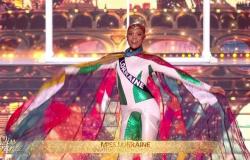« CIt’s no longer of this time,” said the organizers of Miss Netherlands this Thursday, December 12. After thirty-five years of existence, the famous national beauty contest is bringing down the curtain. The budget previously allocated to the event will now serve as a platform to raise awareness about “unrealistic beauty standards” and highlight stories of “successful women”. “Times have changed,” said competition director Monica Van Ee. And we evolve with the times. »
Every evening from 6 p.m.
Receive the information analyzed and deciphered by the Point editorial team.
Merci !
Your registration has been taken into account with the email address:
To discover all our other newsletters, go here: MyAccount
By registering, you accept the general conditions of use and our confidentiality policy.
Is it time to do without Miss competitions? The question also enters the French public debate at the end of each year. Vehicle of a retrograde and sexist image of women for some, pure entertainment celebrating beauty for others: while the 95e edition of Miss France – a high mass bringing together an average of 8 million viewers – is to be held this Saturday, December 14 in Poitiers (Vienna), this year will have to deal, as usual, with pro and anti.
“Saturday there is the annual meeting […] we all come together on this network in front of Miss France”; “So pathetic, still in 2024, the Miss France”; “Saturday evening, it’s Miss France. My woke side is taking a break,” we could read in recent days on the social network X, under the hashtag #MissFrance, the favorite venue for this annual disagreement.
“Feminism is deciding to do what I want”
Among the antis, the argument is clear: the Miss France competition, in addition to promoting unrealistic (if not exclusionary) beauty standards, would contribute to objectifying women. Last year, holding the event in Dijon (Burgundy) led to a boycott by fourteen local trade union organizations. This climate, of which the committee is well aware, does not spare the aspirants to the crown, many of whom now justify themselves with counter-arguments about their approach.
“As a woman, I want to show that we can be Miss France and a feminist […] For me, feminism is deciding to do what I want,” insisted Diane Leyre, the day after her coronation in 2022. “It was an opportunity to access dreams that seemed inaccessible to me […] given the working class background from which I came, given my skin color…” confided Sonia Rolland, Miss France 2000, in an even more emancipatory speech.
Sincere words, with the effect of swords in water. “It’s a sexist competition that refers women only to their physical appearance […] an anachronism promoting the archetype of the young girl suitable for marriage”, opposed the association Dare feminism!, in 2021. When the Minister for Gender Equality Élisabeth Moreno accused the rules of the competition of “has been » and ordered the organizers to “change”.
With success. The latter removed, from the following year, most of the conditions imposed on casting: end of the age limit, openness to married women and/or mothers, and tattoos accepted – the only criterion maintained, a minimum size of 1 .70 m.
“On Instagram, Miss competitions every day”
We could then imagine the debate calming down. However, “there remains this image of a standardized body, but also and above all this exhibition of women, the way in which we will exploit her in the media because she is beautiful “in herself”. And this is the crux of the problem…”, underlines Bernard Andrieu, philosopher of the body, professor at Paris-Cité University and author of Stay beautiful (editions of Murmure, 2017).
To Discover
Kangaroo of the day
Answer
Facts (and the very essence of the beauty contest) against which the emancipatory speeches of the Misses, the relative broadening of registration conditions, or the highlighting of the personality and intellectual background of the participants (the latter have more say than in the past and their portraits now represent almost an hour of air time) cannot do much.
And even if they could, “the criticism is also that of a mass media, of an institutionalization of this exhibition”, continues Bernard Andrieu. “There are Miss competitions on Instagram every day!” he says as proof. We take photos, compare ourselves, comment, “like” each other (or not). Ultimately, Miss France is only the tip of the iceberg…” Or the smallest part, and the most accessible to her detractors.






